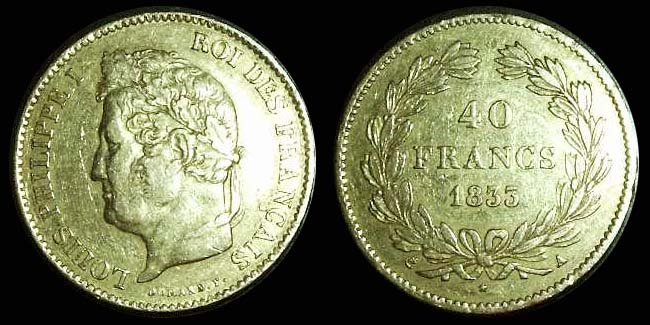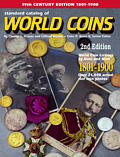

40 Gold Francs Louis Philippe, 1830-1848
12.9039 g., .9000 GOLD, .3734 oz AGW., KM 747
Louis Philippe, called the Citizen King (1773-1850), king of France (1830-48). Louis Philippe belonged to the house of Bourbon-Orléans, a branch of the French royal family stemming from Philippe I, duc d'Orléans, the brother of King Louis XIV. From his birth until 1785 Louis Philippe was known as the duc de Valois and subsequently as the duc de Chartres until 1793, when his father was guillotined, and he succeeded him as duc d'Orléans. Like his father, he was in sympathy with the French Revolution. He joined the Jacobins in 1790, members of a French radical political club. Two years later, at the age of 18, he was given a command in the revolutionary army and, as a colonel, fought at the battles of Valmy and Jemappes. After the defeat of the French army by the Austrians at the Battle of Neerwinden, Holland, in 1793, Louis Philippe was implicated in a plot against the republic, and he fled to Switzerland.
After the execution of his father by the French Revolutionary Tribunal, Louis Philippe became the central figure about whom his supporters, the Orléanist Party, rallied; he did not actively enter into the intrigues for restoring the monarchy, however, and during the regime of the Directory and that of Napoleon, Louis Philippe remained outside France, traveling in Scandinavia, the United States (where he lived for four years in Philadelphia), and England. .
In 1814, after the abdication of Napoleon, he returned to France and was welcomed by King Louis XVIII, who restored to him the Orléans estates. By the late 1820s, however, under the autocratic rule of Louis XVIII's brother and successor, Charles X, the last of the Bourbon monarchs, the French middle and lower classes were growing restive. Louis Philippe was by this time the favorite of those Republican leaders who feared to arouse the opposition of all Europe by establishing a republic, and hoped that Louis Philippe would govern according to popular will.
In 1830, by the July Revolution that overthrew Charles X and the Bourbon dynasty in France, Louis Philippe was proclaimed king by the Chamber of Deputies. At first Louis Philippe was content to rule as a “citizen king” and to conciliate the Republicans who had helped bring him to power; he also dispensed with many royal privileges. Gradually, however, while remaining a constitutional monarch, he became more authoritarian, seeking not only to establish the Bourbon-Orléans dynasty in France but also to consolidate his position among the sovereigns of Europe. The last years of his reign were marked by corruption in domestic affairs and by lethargy in foreign affairs. Louis Philippe, having tried to win the favor of both the democratic and authoritarian elements, was at last deserted by both sides and was deposed by the Revolution of 1848, which led to the formation in France of the Second Republic (1848-52) and the rise of Louis Napoleon, later Napoleon III, emperor of France. After his abdication Louis Philippe lived with his family in England.
 |
You can order Standard Catalog of World Coins 1801-1900. Krause Publication from Amazon.com Very handy reference. 
|